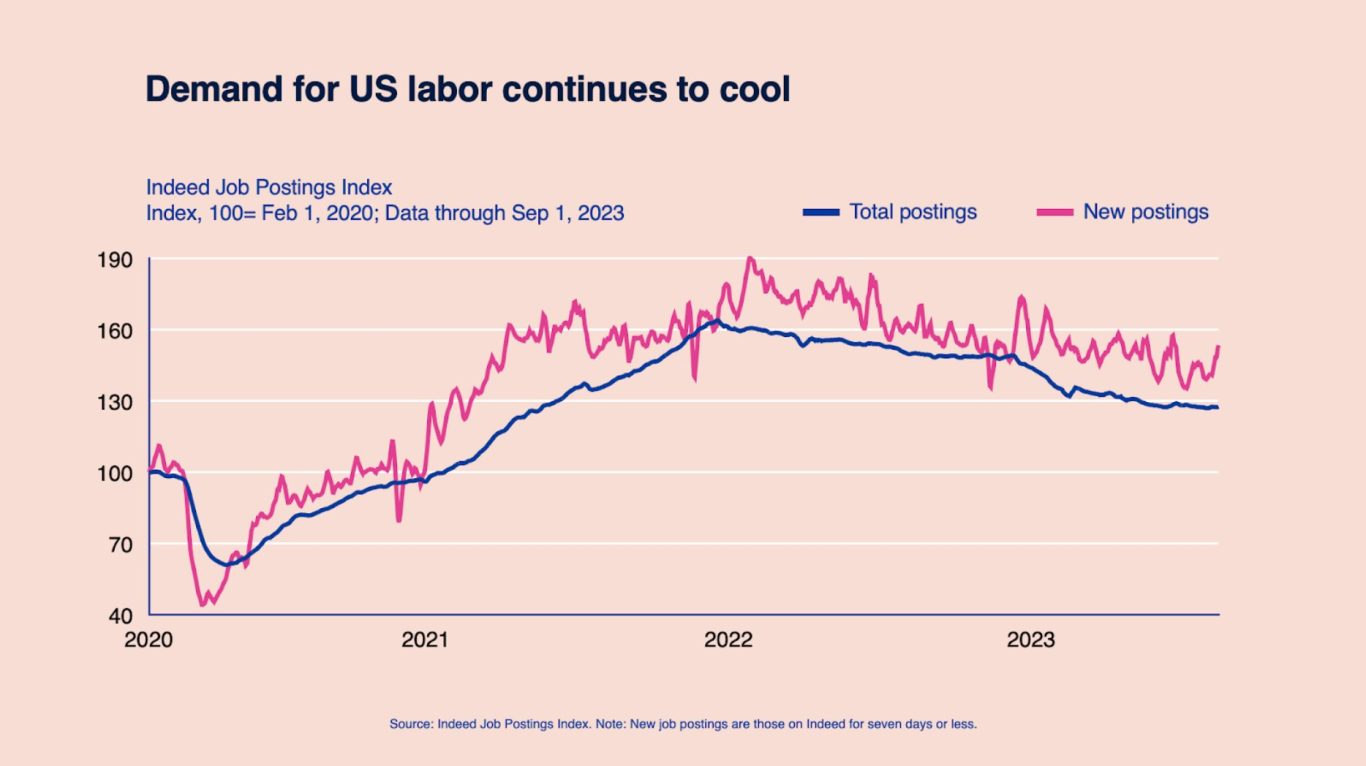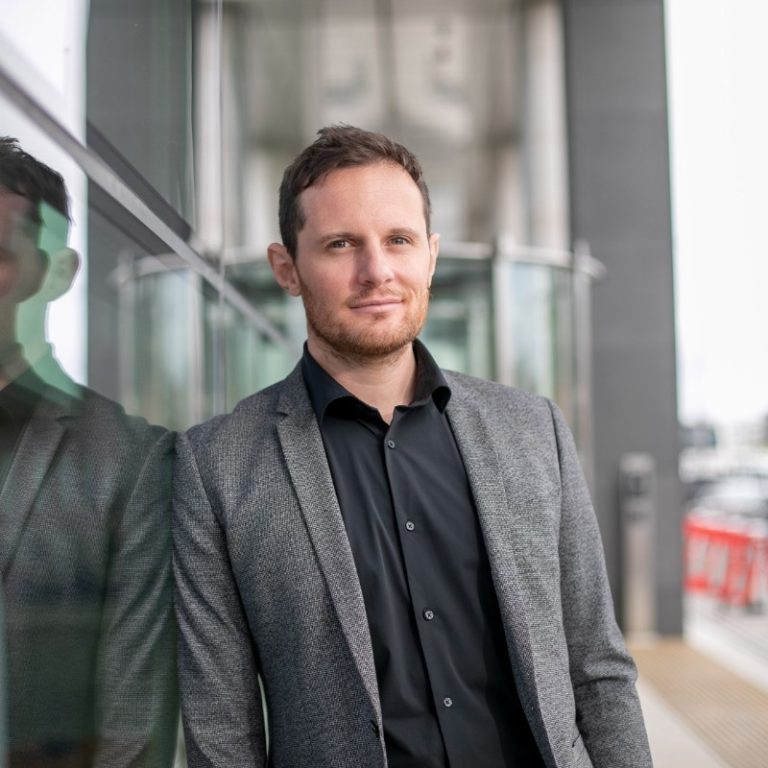Indeed’s chief economist: Gen AI won’t steal your job, humans who embrace innovation will
It’s time to upskill in the realm of generative AI to close skills gaps, says Indeed’s chief economist.
Economist Intel
The Great Resignation is over, but there are still skills and talent shortages.
The situation looks different in different geographies.
How should HR react? And how can AI help?
UNLEASH sat down with Indeed's chief economist Svenja Gudell to find more about the global economic landscape.
“There has never been a recession as talked about as this [potential] one,” Indeed’s chief economist Svenja Gudell tells UNLEASH.
Despite the media hype, we are not currently living in a global recession – and as Gudell shared at Indeed’s recent FutureWorks 2023 conference, she doesn’t think it is coming anytime soon.
Looking specifically at the US economy, “the risk of recession is incredibly low right now”.
This is due to surprisingly strong consumption, as well as a very slow cooling of the labor market.
There has been gradual rebalancing of supply and demand – the Great Resignation trend that began in mid-2021, “where there was a lot of churn in the labor market, that’s really over”.
Gudell shares that while the quit rate is returning to pre-pandemic levels, it is important to note that resignation rates were “fairly elevated heading into the pandemic”; in early 2020, the labor market was already pretty tight, particularly in the US.
The labor market is not as hot as it used to be, but it is looking strong, compared to historic levels.

Credit: Indeed.
For Gudell and Indeed, these trends suggest that the Federal Reserve can pull off a so-called ‘soft landing’.
Jack Kennedy, senior economist at Indeed, explains that a soft-landing is where “inflation falls towards target and the labor market rebalances without a significant downturn and large-scale job losses”.
Gudell is cautiously optimistic about the soft landing – “I am surprised at how smooth the labor market cooling has been so far – when you go from an environment where you raise rates from essentially zero to 5.5%, and you’re not really impacting employment all that much, that’s wild”.
“We have decent labor market participation at this point” – unemployment sits below 4% in the US – “we still have strong demand, all in the fact of very fast rising rates. That really speaks to the resilience of the labor market”.
How European economies compare
So, the economy is looking decent in the US – but what about the biggest European economies? How does their situation compare to their friend across the pond?
Gudell tells UNLEASH that “every country is behaving a little differently”.
This fact doesn’t surprise Gudell – “in my mind, the US happens to be a lot more boom, bust” – but Europe’s labor market is set up different, “it is less volatile”.
Looking at the current situation, “in general, economic growth is a little lackluster in parts of Europe”, states Gudell.

Jack Kennedy, senior economist, Indeed.
Kennedy dives deeper; he shares: “In Europe, inflationary pressures are also easing and labor markets are rebalancing, though the economic backdrop appears more fragile than in the US as tighter monetary policy looks to be increasingly biting.”
Looking specifically at the UK, although inflation is much higher than in the US, it is “on the way down”, notes Kennedy.
However, “wage growth is currently running at a record pace, meaning the Bank of England can’t let down its guard any time soon.
“Labor market rebalancing is gradually happening, though inactivity rates remain stubbornly higher than pre-pandemic amid record long-term sickness.”
How HR must respond to a cooling labor market
Just because the Great Resignation is over doesn’t mean that employers, and particularly HR teams, should no longer be prioritizing employee engagement.
The labor market remains tight, and talent and skills shortages remain a challenge, particularly in sectors like healthcare and hospitality.
To retain and attract talent, employers and HR teams need to focus on compensation – Indeed’s data still shows that the number one factor in workers deciding if they want to stay in their current job, or look for a new one.
But increasingly people are also looking at the “full package, the full experience” – “it is not just about how much you’re going to get paid”, other elements like flexibility, recognition, diversity and wellbeing benefits are also super important to employees today.
“Work culture in general has become more important than it was in 2008” – when the world was in recession. “It’s not just about the cold, hard cash – it is also everything that comes along with it”, shares Gudell.
Learning and development (L&D) has also become super important, “particularly when you have a mismatch between skills on the supply and demand side of the labor market”.
For Gudell, the secret to success could be public-private partnerships –“it is oftentimes really hard because in a free moving labor force, you could be investing a lot in a worker, then that worker [leaves]…It’s bit a of a deadweight loss.
This means that there are often less skilling on the job than employees would like, but when there’s more government support, the L&D is often more successful.
This echoes the perspectives of Fujitsu’s chief technology office Vivek Mahajan in a recent press briefing.
AI and the future of the labor market
Gudell also sees AI, and particularly the newest iteration – generative AI – as having a crucial role to play in L&D, and fixing the “skills mismatch”.
It can help identify the skills gaps, as well as “give [employees] extra tooling to perform this skill well, and make [workers] more productive at the same time”, notes Gudell.

Svenja Gudell, chief economist, Indeed.
For Gudell, AI, and particularly generative AI, has huge potential to transform the world of work.
Indeed’s new AI at Work report – this analyzed 55 million job postings on Indeed and more than 2,600 skills, and was launched the 2023 FutureWork conference – found that generative AI touches virtually every job out there.
Just one in five jobs had high exposure to generative AI – this means the technology had 80% or more of the skills needed to perform that job. Examples of jobs highly exposed to generative AI include software development, law, HR and marketing.
However, even for these highly exposed jobs, this data doesn’t mean that generative AI will completely replace humans – instead it’ll transform these roles for the better.
Gudell tells UNLEASH: “It is hype that all of our jobs are going to be taken by generative AI – I don’t think that’s going to happen, it’s not good enough for that.
“Humans still remain incredibly important – generative AI is going to perform tasks that oftentimes humans find annoying [and] don’t really like doing” – and this will drive productivity.
In reality, it isn’t generative AI that is going to take your job, instead it is “the person that knows how to work with the tools that generative AI has given them” that will do that.
Change is hard, and “there are a lot of unknowns and uncertainties”. Gudell concludes: “We need to be careful to think about bias, ethics, and how we apply AI” – transparency must be top of mind.
AI, Indeed and UNLEASH World
Automation and AI is going to be front and center at UNLEASH World 2023.
Indeed is a Diamond Sponsor of our Paris show, and its VP of Enterprise Marketing, Ryan Batty, is going to be speaking about how AI can make hiring simpler, faster, and more human.
HR tech guru Josh Bersin, as well as HR leaders like Anika Grant and James Purvis, will also be sharing invaluable, in-person, actionable insights on how to use AI to your advantage.
Sign up to the UNLEASH Newsletter
Get the Editor’s picks of the week delivered straight to your inbox!

Chief Reporter
Allie is an award-winning business journalist and can be reached at alexandra@unleash.ai.
